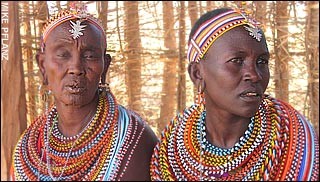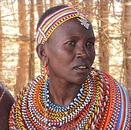 |
|---|
| Mkamasiye Lebwaketa and Paulina Lekuriya wear the tribal bead necklaces their 'women-only' village sells. |
 
|
Thriving women-only village is attacked by jealous locals
Telegraph UK
Fri July 15, 2005
A group of Kenyan women who fled abusive husbands to set up their own women-only community are facing increasingly violent attacks by local men angry at their success.
Turning traditional African patriarchy on its head, 15 women established Umoja village in 1990, as a refuge after their husbands' behaviour forced them to flee their homes.
Since then the village where women rule has expanded, its 48 members earning a living selling tourists brightly-coloured bead necklaces unique to their tribe, the Samburu.
However this revolution in their midst has outraged elders in the nearest town, Archer's Post, one dusty street lined with two dozen wooden shacks, in a scorched valley 200 miles north of Nairobi.
Angry young men with no money in their pockets now stop minibuses taking tourists to the nearby Samburu and Buffalo Springs National Reserves, warning drivers against stopping at Umoja.
Gangs a dozen strong have mounted daytime raids through the thorn fence circling the village, chasing the women into the bush, beating them with clubs and threatening to torch their stick-and-dung homes.
"We do not have peace in the village now. These men are so angry because we have money and we do not give them any," said Rebecca Lolosoli, 43, Umoja's de facto chief and one of its founders.
"We ran away first because we were being beaten and now we are trying to change our lives, we are being beaten again because of how we are doing well."
Local authorities have promised to investigate, but there is great pressure on police officers to turn a blind eye.
Umoja's first 15 members came from isolated villages dotted across this empty valley, bisected by the Ewaso Nyiro river.
They all fled after daily beatings from their husbands or brothers, often because they said they had been raped, some allegedly by British soldiers training nearby, and so had brought shame on their homes.
After trying to survive alone, brewing traditional beer in the bush to sell by the roadside, they banded together and began building Umoja, which means ''unity'' in Kiswahili.
Money started flowing into their newly-opened bank account from sales of the bead necklaces, which take three days to make.
Word spread. More women arrived, their belongings on their heads, babies strapped to their backs.
"I was raped and I told my husband and he started beating me, even when I was carrying the child, so I ran away and joined these people here," said Paulina Lekuriya, a striking woman with a wide smile who guesses her age at 35. Her story is echoed by the others.
Now Umoja has a campsite, is becoming a regular stop for backpackers and lorries, has a long-running craft stall and a new 50-pupil primary school.
Initially, local men tolerated the thriving community. Some formed relationships with the women - which the women controlled - fathering children who now live with their mothers in the village.
Some men tried to ape Umoja's success, setting up a rival trinket stall and cultural centre a kilometre down the road, which flopped within months.
Now their patience has worn out and the atmosphere is turning ugly.
"They are not supposed to be living like that, it is not our way," said one middle-aged man outside a bar in Archer's Post, his teeth brown from chewing the narcotic leaf miraa. He gave his name only as Peter.
Umoja has been attacked twice in the last three months. Attempts have been made to steal the village's 10 cows.
Tradesmen in Archer's Post refuse to sell to the women, even publicly spitting in their faces.
"They see us laughing, and they don't want us to laugh. They say we are too proud because we have money, because we always walk proudly in the road, but I say, what is wrong with that?" said Mrs Lolosoli.
"This is now our place and we will not run from here," said Nasara Lekutas, as the women sat in the shade of a wide acacia tree quietly nodding their determined agreement.


 Share your thoughts in the Forum
Share your thoughts in the Forum
